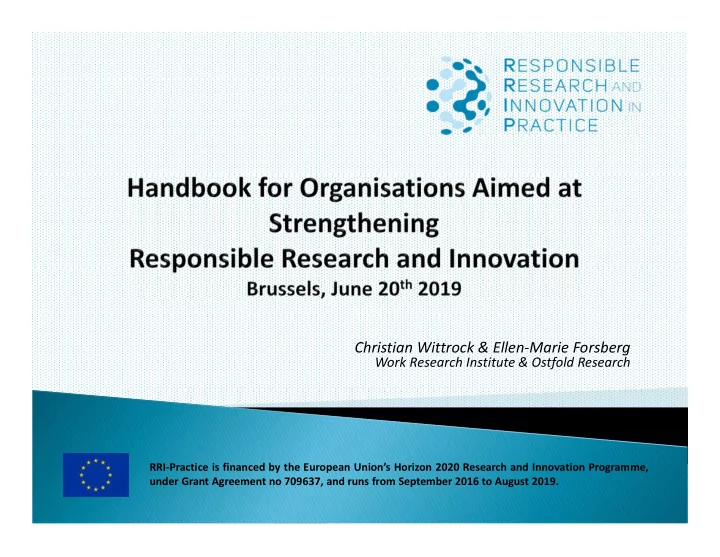

Christian Wittrock & Ellen-Marie Forsberg Work Research Institute & Ostfold Research RRI-Practice is financed by the European Union’s Horizon 2020 Research and Innovation Programme, under Grant Agreement no 709637, and runs from September 2016 to August 2019.
• Brief handbook overview • The idea behind the RRI-Practice Handbook • The research behind the RRI-Practice Handbook • The content of the handbook - strategies furthering RRI - good practice examples
• A very warm thank to everyone contributing to the RRI- Handbook! • Many consortium members, employees in researched organisations, as well as externals have helped. • Many good practice cases are co-written.
• Objectives: Provide practical advice on how to do RRI in organisations, 1. Provide material useful in mobilising for RRI, 2. Provide a brief introduction to RRI. 3. • The handbook is aimed at (potential) practitioners of RRI. • Newcomers to RRI as well as organisations already involved with RRI should benefit. • Target audience: - managers at all levels, - potential change agents/ RRI champions, - interested researchers.
• Foreword • Introduction: Why RRI is relevant and important in organisations • RRI practices described in this handbook • The target group and purpose of the handbook • Implementing RRI in organisations: general lessons (11 recommendations) • Good organisational practices furthering RRI (11 case descriptions) • Transferring good practices to new organisations • Annex A: On the RRI-Practice project • …. Links to web resources throughout
• In our case research funding or research performing • … or are they? • Organisations differ, also across our two categories. • Organisational practices are to a certain extent embedded. 1) • Therefore (effective) organisational practices differ, relative to the organization in which they are applied. 2-4) • Innovations are path-dependent. 5)
• … or is it? • Organisational concepts that diffuse have interpretative viability or pragmatic ambiguity. 6-7) • RRI is an umbrella concept: 8) - gender & diversity key - open access key - science education key - societal engagement key - ethics key … and has several process dimensions.
• To provide recommendations on RRI general enough to fit most organisations, • while being detailed enough to foster ideas on which concrete actions to take in each individual organisation. For our case descriptions of good practices: • To provide contextual information. • To provide information on how the practice evolved. • To provide information on how the practice was sustained.
• Analysed and worked with 23 organisations (e.g. universities and research councils). • 7 European and 5 non-European countries. • Data from: - Document reviews, - interviews, - focus groups, - workshops.
• Comparative work using neo-institutional (meta) theory as backbone: 9-10) - organisational structures (organisations as rational systems) - organisational culture (organisations as natural systems) - interchange dimensions (organisations as open systems) • For each element of RRI and across keys and process dimensions, as well as national contexts. 11)
• Decide on scale of implementation • Craft policies for RRI • Provide incentives for RRI • Create guidelines for aspects of RRI • Create organisational routines supporting RRI • Leverage internal and external change processes • Work with your external environment • Create organisational learning processes • Create pilot programmes and infrastructure • Create a coherent mix of instruments and means • Be an RRI champion – or make use of them!
• The Christine Mohrmann Programme – changing gender (im)balance at Radboud University (NL) • Supporting diversity and inclusion – The Southwest Borderlands Initiative at Arizona State University (US) • Establishing an open-access platform with regional impact – the Brazilian SciELO portal (BR) • Establishing open-access publishing publication and open science at Oslo Metropolitan University (NO)
• Bringing science into the school curriculum – a distributed network for pedagogical actions at CEA, the Alternative Energies and Atomic Energy Commission (FR) • The ‘Science Express’ mobile exhibition bringing scientific insight to millions of people by train (IN) • Sustainability through local engagement – the Urban Lab neighbourhood development initiative at Karlsruhe Institute of Technology (DE) • Engaging stakeholders in policy design through consultation processes – Innovation Strategy for Smart Specialisation (BG)
• Engaging with patients on medical research and rare diseases – the ‘Friends of Telethon’ programme (IT) • The multiple aspects of addressing ethics at Wageningen University and Research (NL) • Promoting RRI processes in an organisation – Creating the AREA framework for Responsible Innovation at the Engineering and Physical Sciences Research Council (UK)
Granovetter, M. (1985). Economic Action and Social Structure: The Problem 1. of Embeddedness. American Journal of Sociology, 91(3), 481-510. doi:10.2307/2780199 Latour, B. (1984). The powers of association. The Sociological Review, 32, 2. 264-280. doi:10.1111/j.1467-954X.1984.tb00115.x Røvik, K. A. (2016). Knowledge Transfer as Translation: Review and Elements 3. of an Instrumental Theory. International Journal of Management Reviews, 18(3), 290-310. doi:10.1111/ijmr.12097 Strang, D., & Meyer, J. W. (1993). Institutional Conditions for Diffusion. 4. Theory and Society, 22(4), 487-511. doi: 10.1007/Bf00993595 Arthur, W. B. (1989). Competing Technologies, Increasing Returns, and Lock- 5. in by Historical Events. The Economic Journal, 99(394), 116-131. Benders, J., & Van Veen, K. (2001). What's in a Fashion? Interpretative 6. Viability and Management Fashions. Organization, 8(1), 33-53. doi:10.1177/135050840181003
Giroux, H. (2006). 'It Was Such a Handy Term': Management Fashions and 7. Pragmatic Ambiguity*. The Journal of Management Studies, 43(6), 1227. Hirsch, P. M., & Levin, D. Z. (1999). Umbrella Advocates Versus Validity 8. Police: A Life-Cycle Model. Organization Science, 10(2), 199-212. doi:10.1287/orsc.10.2.199 Scott, W. R. (2014). Institutions and organizations: Ideas, interests, and 9. identities. Thousand Oaks, CA: Sage Publications. Scott, W. R., & Davis, G. F. (2007). Organizations and organizing : rational, 10. natural, and open systems perspectives. Upper Saddle River, N.J: Pearson Education. Wittrock, C., & Forsberg, E.-M. (forthcoming). Organisational Development 11. for Responsible Research and Innovation: A Comparative Analysis of Applications in 12 Countries and 23 Organizations.
RRI-Practice is financed by the European Union’s Horizon 2020 Research and Innovation Programme, under Grant Agreement no 709637, and runs from September 2016 to August 2019.
Recommend
More recommend